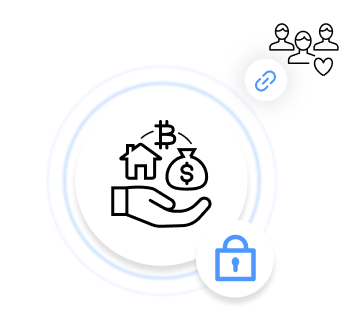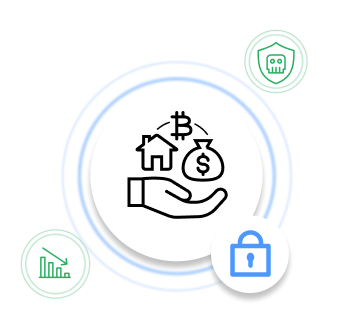
What is asset management?
Usually, asset management is associated with high-net-worth individuals, who hire an asset management company to develop an individual investment strategy for them. A financial services company can be the most cost-effective way to manage one’s portfolio.
There is one subtle but very important aspect of an asset management system – the protection of the assets.
Asset protection aims at applying various financial, technical, and legal means to protect your assets.
Why is that so important? Because there is one fundamental difference between the applicability of asset management and asset protection.
As we already noted, asset management is usually used by high-net-worth individuals. Asset protection, on the other hand, can be used by anyone, and in reality, it is way more important for people with fewer assets than for rich people. Why is that? Because failing to claim a $100K inherited asset such as life insurance or a bank account might be a small issue for a wealthy family, but it might have huge importance for other families.
Many people assume that because asset management is for wealthy people, the same applies also to asset protection. As we saw, in reality, it is exactly the opposite.
Asset protection – the neglected side of asset management
In a very practical sense, asset protection includes these basic steps:
- cataloging your assets in a secure environment
- With your nominated assets
- tracking your assets
- applying technical, financial, legal or other means to protect your assets in the event of anything unforeseen happening
Most asset management tools aim at protecting the long-term asset value – insuring your real estate, establishing a trust, etc. Almost none of the existing asset protection tools, though, aim at protecting asset ownership.
Traditional asset protection tools focus on protecting the value of the asset, not the ownership.
And most importantly, they fail to cover against some very important internal risks:
- These options would fall short if something were to happen to you AND your partner together.
- The people with whom you share the information about your assets might forget how to access it. Or they might be too young or too old to remember the access instructions.
- And most importantly, they don’t give you the option to allow access ONLY if something happens to you, not before.
Why asset protection is critical for you and your family

You have multiple types of assets – life insurance, bank accounts, stock options, company stocks, cryptocurrencies, real estate, to list a few. This increases the complexity of asset tracking for the owner, and especially for the beneficiaries.

Your assets reside in more than one country. This situation is particularly familiar to expats. When they move from country to country, they usually leave a bank account here, life insurance or a pension fund there. This further complicates the asset tracking and, as a result, increases the need for asset protection.

Your family members live in a country different from the country where your assets are stored. For example, you live in the US and your assets are there, but your family members are in South America, Europe or Asia. This makes asset identification and location especially challenging for the family members.
How big is the problem?
$1 billion per year in the US alone and only for life insurances. How big is the problem of protecting all types of assets from these risks? As you can see, it’s huge. As of 2020, so-called unclaimed assets approach $100B just in the US. Latest reports for the UK show £77B. Globally, we are talking about trillions of dollars. And the upward trend is alarming: a $5B increase per year in the USA alone.
New York Times
“There Are Billions in Unclaimed Assets Out There. Some Could Be Yours.”
Government agencies have tens of billions of dollars’ worth of bank accounts, insurance…
CNN
“More than 30 million people have unclaimed money or assets. Are you one of them?”
New York (CNN) — You may be among the millions of people nationwide who have cash or assets waiting to be claimed.
Moneyfacts
“Billions lost in forgotten accounts and pensions”
New research from Sanlam UK suggested there could be anywhere between £15bn and £77bn in lost money waiting to be…
You can’t fail to ask yourself how that is possible. The answer is that most asset protection tools don’t have the legal obligation to proactively notify your beneficiaries. So they aim primarily to protect the asset value because chances are high that one day that asset will become theirs, instead of reaching your family.
Most asset protection tools don’t have the legal obligation to proactively notify your beneficiaries if anything happens to you!
Yes, the blunt answer is that they simply don’t have any incentive to notify your heirs. It’s way better for them to have the money stay with them.
How does DGLegacy’s asset protection work?
This way, in the event of anything unforeseen happening to you, your loved ones:
![]() Are aware of your assets
Are aware of your assets
![]() Can identify and locate your assets
Can identify and locate your assets
![]() Can minimize the chance of unclaimed assets.
Can minimize the chance of unclaimed assets.
HOW IT WORKS
Protect your loved ones quickly and easily

Set up “alive” event
Crucial for the system's functioning, this step allows us to monitor that you are “alive”, we name it HeartBeat protocol. You have the option to adjust according to your preferences.
![]()

Catalog your assets
Catalogue the assets via DGLegacy, with minimum basic information needed, allowing your beneficiaries to identify and locate them.
![]()

Protect your assets
In case of a cyber security breach in a company which holds your assets, or media alerts for a risk related to its financial stability, DGLegacy will proactively notify you.
![]()

Invite beneficiaries and trustees
To add beneficiaries and trusties you need only their basic contact information - email and name. They will receive an invitational email.
![]()

Detection of fatal event
The Heartbeat protocol of DGLegacy, custom-engineered for your safety, confirms your well-being and detects any unexpected events. We proactively notify your beneficiaries about their designated assets in case of a tragic event.
TESTIMONIALS
Why DGLegacy® is the #1 place to secure your assets
![]()
![]()
CATALOGUE YOUR FIRST ASSET
Protect your loved ones when it matters the most
Join the people who trust DGLegacy® and start protecting your assets now.
 Victor
Victor Vlad
Vlad Ingrid Henke
Ingrid Henke Alara Vural
Alara Vural Agnieszka Michalik
Agnieszka Michalik Stella Schmitz
Stella Schmitz